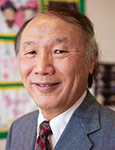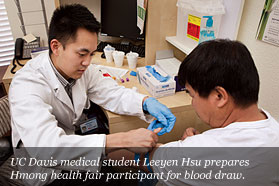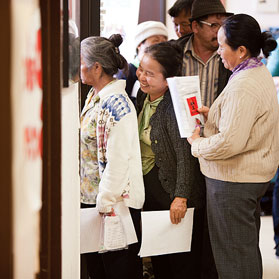Outreach: Cancer center brings comprehensive cancer prevention strategies to diverse communities

"National Cancer Institute-designated comprehensive cancer centers are distinguished from other NCI cancer centers by their excellence in outreach to the community and education of health professionals."
It also understands that while death rates have dropped for many types of cancer, thanks to earlier detection and regular screening, many groups suffer disproportionate cancer burdens and correspondingly higher death rates.
That’s why the cancer center’s physicians
and researchers are working to encourage American Indian women to get mammograms, Asian Americans to get vaccinated against hepatitis B, and Latinos and African Americans to get colorectal screening. And it’s the motivation for an invigorated campaign to educate health care providers about the importance of enrolling underrepresented groups in cancer clinical trials.
These and other efforts helped UC Davis earn the coveted "comprehensive cancer center" designation from the National Cancer Institute earlier this year.
"National Cancer Institute-designated comprehensive cancer centers are distinguished from other NCI cancer centers by their excellence in outreach to the community and education of health professionals," explains UC Davis professor Moon Chen, associate director for cancer control at the UC Davis Comprehensive Cancer Center.
Chen serves as the principal investigator for the Asian American Network for Cancer Awareness, Research and Training (AANCART), which is the only NCI-designated National Center for Reducing Asian American Cancer Health Disparities. This designation makes the UC Davis Comprehensive Cancer Center the national scientific research capital for addressing cancer control for Asian Americans.
 Through these collaborations, AANCART is able to reach approximately one-third of all Asian Americans.
Through these collaborations, AANCART is able to reach approximately one-third of all Asian Americans.
The national center is a consortium that includes the Chinese Community Health Resource Center in San Francisco, Hmong Women’s Heritage Association in Sacramento, as well as researchers from UCLA, UCSF, University of Hawaii, Manoa, and University of Washington, Seattle. Through these collaborations, AANCART is able to reach approximately one-third of all Asian Americans nationally.
"Asian Americans are the only ethnic group for which cancer is the leading cause of death," says AANCART community health educator and administrative core director Julie Dang."We work in partnership with communities to reduce cancer health disparities by conducting community-based education, training and research by, for, and with Asian Americans."
Dang oversees a Sacramento-based NCI-funded AANCART project designed to educate, engage and encourage biospecimen contribution for cancer research in Asian American communities. "There are many cultural and cognitive barriers to contributing blood or other biospecimens for cancer research," she explains."We work with trusted community partners to develop culturally and ethnically specific outreach and educational strategies that resonate with their community. One strategy includes hosting community biospecimen blood drives, which has resulted in more than 200 Asian American participants contributing over 500 specimens."
Among the centers’ other programs is an NCI-funded interactive multimedia software program designed to educate African-American and Latino patients about colon cancer risk and to boost colon cancer screening rates.
Another initiative encourages the Chinese, Hmong, Filipino and Korean communities to participate in clinical trials, which are vital to the testing of new procedures and development of new cancer therapies. Trials help researchers evaluate the effectiveness and safety of medications or medical devices by monitoring their effects on large groups of people.
"While racial/ethnic minorities make up nearly half of the U.S. population – and already constitute the majority in such states as California, Texas and Hawaii – relatively few participate in clinical trials," says Chen. "Only 3 percent of adults are enrolled in clinical trials, and only 10 percent of those are minorities."
Chen also leads the UC Davis Comprehensive Cancer Center’s participation in Enhancing Minority Participation in Clinical Trials. EMPaCT, as it’s known, is a consortium of five National Cancer Institute-designated cancer centers and National Institutes of Health disparities research program sites, including UC Davis, seeking to increase representation of multiple minority groups in cancer trials.
 "Cancer doesn’t discriminate. The behavior of tumors and reactions to therapies can vary in different patient populations.
"Cancer doesn’t discriminate. The behavior of tumors and reactions to therapies can vary in different patient populations.
Understanding these differences is incredibly valuable."
Karen Kelly, associate director for clinical research at the UC Davis Comprehensive Cancer Center, cites an example from her own experience about the importance of these efforts.
"The first lung cancer therapy drug was an epidermal growth factor receptor (EGFR) inhibitor called gefitinib," she recalls. Kelly’s research group evaluated the drug in the United States, while a second group in Asia did the same."We found that Asians in particular had a greater response to the drug because, as it turned out, they had an EGFR mutation," she says. "If we hadn’t had Asians in the trial, we might not have made this discovery."
Today, Kelly oversees more than 150 clinical trials across all cancer types at the center, with an emphasis on increasing participation, known as accruals, from all parts of the community. "Cancer doesn’t discriminate," says Kelly. "The behavior of tumors and reactions to therapies can vary in different patient populations. Understanding these differences is incredibly valuable."
Among the centers’ other programs is an NCI-funded inter-active multimedia software program designed to educate African-American and Latino patients about colon cancer risk and to boost colon cancer screening rates. The research project, now under way in clinics in New York, Texas and Colorado, in addition to UC Davis, allows patients to view the educational program while waiting for their doctors during regular primary care visits.
Marlene von Friederichs-Fitzwater, director of the center’s Outreach Research and Education Program, oversees projects involving adolescent cancer survivors, American Indian women, and the lesbian and gay communities.
Diagnosed with cervical cancer as a young adult, von Friederichs-Fitzwater has a special affinity for 15- to 39-year-old cancer patients, most of whom don’t feel that they have much in common with other patients in either pediatric or adult clinic waiting rooms, hospital floors or cancer support groups. She’s working on a variety of projects – often involving social media and high tech – designed for both outreach and accrual.
The Mothers’ Wisdom Breast Health Program, funded by a three-year grant from the California Breast Cancer Research Program, is designed to increase mammography screening in American Indian women. This group is the least likely to survive longer than five years after diagnosis, to have their breast cancer diagnosed at the earliest stage, or to have had a recent mammogram.
"California has the largest population of Indians of any state and more than 109 different tribes," says von Friederichs-Fitzwater, an assistant professor in the UC Davis Department of Internal Medicine. "It’s a challenge to develop culturally appropriate protocols to increase mammography screenings and save lives."
She also points out that lesbians and gay men experience higher rates of some types of cancer. "Yet this group remains very understudied and underserved. We’re beginning to look at the reasons why there are these disparities and why the lesbian, gay, bisexual, transgender (LGBT) community isn’t getting good health care."
Late last year, she launched a UC Davis Comprehensive Cancer Center/Sacramento State University Partnership initiative to form an LGBT Cancer Advisory Task Force. Its goal is to plan research and educational interventions to address LGBT cancer health disparities and ultimately increase LGBT clinical trial accruals.
"The center’s new designation is a tremendous honor and a great recognition of work done, but it’s also a call for yet more work to be done," she says. "We’ve come a long way, but we still have a long way to go."






